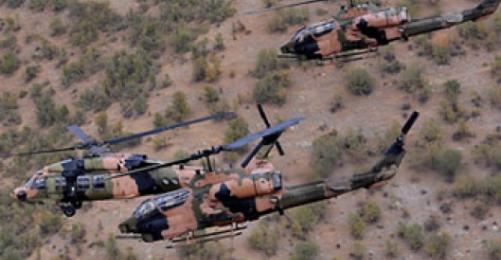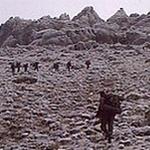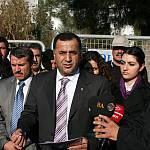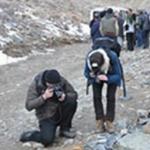General Staff Denied Use of Chemical Weapons

The General Staff Presidency issued a statement on the alleged use of chemical weapons by the Turkish Armed Forces (TSK) and announced that the inventory of the TSK did not include chemical weapons and ammunition.
It was furthermore claimed in the statement that the struggle with the Kurdistan Workers' Party (PKK), listed as a terrorist organization by the European Union and other countries, "was carried out in accordance with national and universal law".
On 7 December, nuclear weapons expert Dr. Robert M. Gould paid a visit to the Diyarbakır branch of the Human Rights Association (İHD) to obtain information from İHD officials on recent allegations regarding the use of chemical weapons. İHD Diyabakır Branch Secretary Raci Bilici provided Gould with their report on chemical weapons and asked him to investigate the issue.
Allegations regarding chemical weapons
Moreover, allegations were put forward concerning to the use of cluster munitions in the course of operations in eastern and south-eastern Turkey and cross-border operations.
* The report of the Cluster Munitions Coalition (CMC) mentioned media news that revealed the use of cluster munitions in a cross-border operation of the Turkish Armed Forces on the PKK camp in Zaleh in January 1994.
* It was reported that cluster munitions were used in the bombing of Zap carried out after the aerial strike on the Kazan Valley (Çukurca/Hakkari) on 22 October 2011 when chemical weapons were allegedly used by the TSK.
* According to an announcement of the PKK, cluster munitions were used in aerial strikes on 4, 14, 19 and 20 September. It was stated that cluster munitions were frequently being used in cross-border operations since 2007. The announcement also put forward that cluster bombs containing phosphorus were used in an attack on Qandil (location of the PKK base in northern Iraq) in January and on 10 April 2009.
* A report prepared by the Forensic Medicine Institution on the "Return to Life" operation in the Bayrampaşa (Istanbul) Prison on 19 January 2000 claimed that evidence related to the use of chemical weapons was determined. The report was based on research and autopsies and was submitted to the Ministry of Justice. Twelve detainees and convicts died at the Bayrampaşa Prison in the course of the operation, 55 people were wounded.
Alatn Sabız, Gendarmerie Sergeant on duty at the time, had said that the "intervention was done with gas bombs of a different, unknown kind".
* The Initiative for a Mine-Free Turkey stated that Turkey still held cluster munitions in their stock and that the government failed to officially announce the number of bombs, their types and where they were purchased from as stipulated in the signed agreement.
An official from Turkey participated as an observer in a conference in Dublin in May 2008. He gave the following account on stocks in Turkey:
"Cluster munitions are the most effective weapons in the war against a legitimate enemy and they are found in our stock in large numbers. You cannot just prohibit these weapons as long as you have not found a suitable alternative for cluster bombs". (ÇT)






